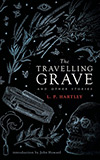L. P. Hartley
| Full Name: | Leslie Poles Hartley |
| Born: | December 20, 1895 Whittlesay, Cambridgeshire, England, UK |
| Died: | December 13, 1972 London, England, UK |
| Occupation: | Writer |
| Nationality: | British |
| Links: |
|
Biography
Leslie Poles Hartley was the son of Bessie and Harry Bark Hartley, a solicitor and a JP. He had two sisters, Enid and Annie Norah. While he was young, the family moved to Fletton Tower, a small country estate near Peterborough. Hartley was educated in Cliftonville, Thanet, then briefly at Clifton College, where he first met Clifford Henry Benn Kitchin, then at Harrow. In 1915, during the First World War, he went up to Balliol College, Oxford, to read modern history, and there he befriended Aldous Huxley. This was a time when most of his contemporaries were volunteering for the armed services instead of pursuing university careers.
In 1916, with the arrival of conscription, Hartley joined the army, and in February 1917 he was commissioned as an officer in the Norfolk Regiment, but for health reasons he was never posted overseas for active duties. Invalided out of the army after the war, he returned to Oxford in 1919, where he gathered a number of literary friends, including Lord David Cecil.
Some of Hartley's early work was published in Oxford Poetry in 1920 and 1922. In 1920 he edited Oxford Outlook, with Gerald Howard and A. B. B. Valentine, and in 1921 with Basil Murray and Christopher Hollis. At this time he was introduced by Huxley to Lady Ottoline Morrell. Kitchin, who was also then at Oxford, introduced him to the family of H. H. Asquith, and Cynthia Asquith became a lifelong friend. Despite being named after Leslie Stephen, Hartley always belonged to the Asquith set and was rebuffed by the Bloomsbury group.
After his years at Oxford, Hartley became a book reviewer. Although he enjoyed rapid social success, his career as a writer failed to take off, and he was unhappy. In 1922 he suffered a nervous breakdown. Soon afterwards he started spending much of his time in Venice, and he continued to do so for many years. Hartley was homosexual but not open about his sexuality until toward the end of his life. Hartley regarded his 1971 novel The Harness Room as his "homosexual novel" and feared the public reaction to it.
Until the success of The Go-Between Hartley had little commercial recognition, although in 1947 he was awarded the James Tait Black Memorial Prize for his novel Eustace and Hilda, and in 1956 he was appointed a Commander of the Order of the British Empire.
Works in the WWEnd Database
Non Series Works |
|||||||||||||||||||
|
|
|
|
|
|||||||||||||||



















 Full Details
Full Details








